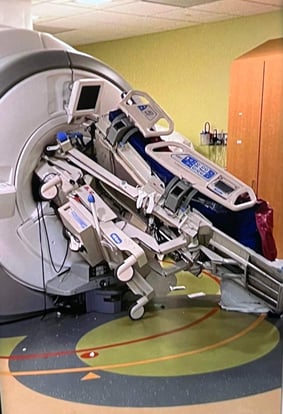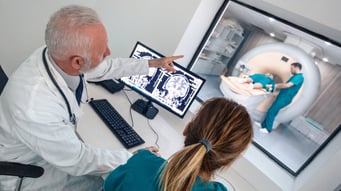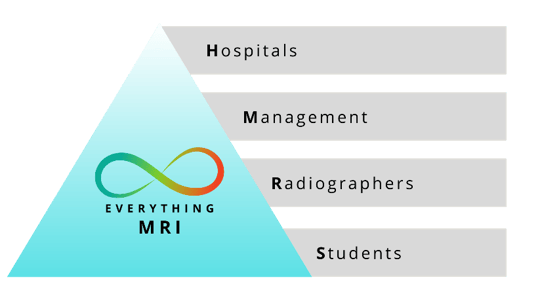Ensuring safety in MRI (Magnetic Resonance Imaging) is a longstanding battle that we all have endured alongside regulators, guideline providers, staff members, and corporate CEO’s, for too long now. Several approaches have been proposed and we fail systematically, without ever asking ourselves why. It is pathological the way of thinking in this space and it automatically brings to my mind the unfathomably pertinent quote from Einstein, “Insanity is doing the same thing over and over and expecting different results.”
Safety and safety awareness in MRI are of utmost importance because MRI machines generate powerful magnetic fields that can cause serious harm if proper precautions are not taken. MRI machines use powerful magnets and radio waves to create detailed images of the body's internal organs and tissues, making them an essential diagnostic tool in modern medicine. However, these electrical-magnetic energies can cause problems if not handled correctly and by competent MRI safety-trained staff. Some of the most emblematic problems/incidents that occur in poorly or unsupervised MRI environments are Projectile accidents - Any ferromagnetic object that is brought near the MRI scanner can be pulled towards the magnet and become a dangerous projectile. This can cause serious injury or even death since said object is moving at extremely high speed towards the scanner. Other MRI safety risks encompass: 
- Burns - MRI machines generate strong magnetic fields that can heat up metal implants or devices within or in close contact with the patient’s body. Most MRI burns that have been reported involve simple direct electromagnetic induction caused by the contact of monitoring devices, such as ECG electrodes, pulse oximetry probes, and monitoring equipment cables touching the patient. Close contact burns (skin-to-skin, skin-to-bore, and skin-to-ancillary equipment) are the most common MRI incident reported to the FDA.
- Hearing damage - MRI machines can produce loud noises during scanning, which can cause hearing damage if appropriate ear protection is not used
- Contrast agent reactions - Contrast agents are used to enhance the visibility of certain tissues during an MRI. In rare cases, patients can have an allergic reaction to the contrast agent, which can be life-threatening if not treated in due time.
On top of MRI safety, ensuring a positive patient experience is of utmost importance. Providing patients with safe, comfortable, and accurate diagnostic procedures while minimizing stress and anxiety should be paramount. Patients undergoing medical procedures such as MRI scans may experience stress and anxiety due to various factors such as:
- Fear of the unknown - Patients may feel anxious about the unknown aspects of the MRI procedure, such as the noise level, the duration of the scan, and the potential discomfort they may experience due to awkward positioning. Also, a stress factor is the fact that they are afraid of the possible negative outcome of such a test. As a consequence, the patient might feel increased heart rate, blood pressure, and shallow breathing, which can negatively impact the patient's health and ultimately the scan quality and possible diagnosis. In very extreme cases, the examination must be stopped and even postponed.
- Claustrophobia - The enclosed space of the MRI machine can be unsettling for some patients, especially those with a history of claustrophobia. This particular issue can cause panic attacks and lead to the patient's inability to complete the MRI scan or even start it.
- Fear of pain - The MRI procedure involves lying still for an extended period of time, which can cause discomfort or pain in some patients, particularly those with physical conditions that make lying still difficult, or when the positioning for certain scans allied to the lack of proper padding contributes to an increase of pressure points that cause soreness and distress. The fear of pain can lead to increased anxiety and can cause the patient to move during the scan, which may result in distorted images and poor diagnostic quality.
- Noise - MRI machines produce loud noises during scanning that can be disturbing for some patients, and in worst-case scenarios, cause hearing problems and deafness. Noise-related anxiety can lead to increased stress levels and hearing damage if appropriate ear protection is not used.

To overcome or reduce these challenges and anxieties, special training and tools for MRI technologists and radiologists are needed to ensure that they are equipped with the knowledge and skills necessary to provide the highest level of care. These training tools can be centered around Claustrophia and anxiety management training to radiographers and ancillary staff, VR training tools for radiology students and radiographers, Remote MRI training/scanning, MRI education videos and written materials.
Allowing patients to feel comfortable and properly looked after during their examinations should be THE priority. Bespoke and state of the art innovations in the MRI world will play a big role in achieving this goal and an example of such innovative approach are the Pearl Technology positioning aids, which allow radiographers to adapt to odd positioning techniques and act out of the box when some patients are not so compliant, providing them more comfort and peace of mind to go through their examination stress free.
In conclusion, taking a holistic approach to safety and patient experience that spans from university studies to hospital management is needed. Both are multifaceted issues that require a comprehensive approach that encompass all aspects of healthcare delivery in a properly structured manner. This includes education and training, implementation of safety protocols and procedures, and ongoing monitoring and evaluation to continuously improve safety practices and patient experience.
About the Author:
Sam Oliveira is a passionate MRI technologist, MRI safety Officer, Advocator and Innovator. As the founder and CEO of Everything MRI as well as the founder of the London MRI Leads Group he is committed to changing and improving the MRI world one step at the time.
Everything MRI is a company dedicated to the holistic improvement of Magnetic Resonance Imaging (MRI) for the benefit of patients, staff, and hospitals. Their story begins with a deep desire to create a better and safer MRI experience for everyone involved. From the moment you’re studying at your university, to the top of your career, they have a means to support and further your skills and educations. For patients undergoing such dauting scans, they have dedicated materials for education and training as well as important partnerships with other companies that provide the best patient positioning and patient experience tools in the market.
The company aims to be involved throughout the whole career of a radiographer/technologist, and support managers and employers in keeping their patients and staff safe while delivering the best MRI services possible.
The main goal is to take a holistic approach to safety that spans from university studies to hospital management. Everything MRI understands that safety is a multifaceted issue that requires a comprehensive approach that encompasses all aspects of healthcare delivery in a properly structured manner. This includes education and training, implementation of safety protocols and procedures, and ongoing monitoring and evaluation to continuously improve safety practices. At every level, they strive to ensure that safety is prioritised and that all individuals involved in healthcare delivery are empowered to take an active role in promoting safety and patient comfort. By looking at safety in a holistic manner, Everything MRI can create a culture that benefits patients, healthcare professionals, and the entire healthcare system.

The London MRI Leads Group strives to advance the field of MRI by fostering collaboration and knowledge-sharing among MRI professionals across London. The group comprises MRI experts from major private and public hospitals in London and offers networking opportunities, educational resources, and a forum for discussion on the latest technological trends and advancements in MRI and MRI safety. The aim is to drive innovation and excellence in the field of Magnetic Resonance.
